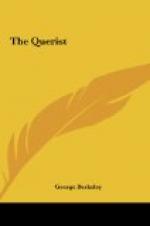169. Qu. Whether Ireland can hope to thrive if the major part of her patriots shall be found in the French interest?
170. Qu. Why, if a bribe by the palate or the purse be in effect the same thing, they should not be alike infamous?
171. Qu. Whether the vanity and luxury of a few ought to stand in competition with the interest of a nation?
172. Qu. Whether national wants ought not to be the rule of trade? And whether the most pressing wants of. the majority ought not to be first consider’d?
173. Qu. Whether it is possible the country should be well improved, while our beef is exported, and our labourers live upon potatoes?
174. Qu. If it be resolved that we cannot do without foreign trade, whether, at least, it may not be worth while to consider what branches thereof deserve to be entertained, and how far we may be able to carry it on under our present limitations?
175. Qu. What foreign imports may be necessary for clothing and feeding the families of persons not worth above one hundred pounds a year? And how many wealthier there are in the kingdom, and what proportion they bear to the other inhabitants?
176. Qu. Whether trade be not then on a right foot, when foreign commodities are imported in exchange only for domestic superfluities?
177. Qu. Whether the quantities of beef, butter, wool, and leather, exported from this island, can be reckoned the superfluities of a country, where there are so many natives naked and famished?
178. Qu. Whether it would not be wise so to order our trade as to export manufactures rather than provisions, and of those such as employ most hands?
179. Qu. Whether she would not be a very vile matron, and justly thought either mad or foolish, that should give away the necessaries of life from her naked and famished children, in exchange for pearls to stick in her hair, and sweetmeats to please her own palate?
180. Qu. Whether a nation might not be consider’d as a family?
181. Qu. Whether other methods may not be found for supplying the funds, besides the custom on things imported?
182. Qu. Whether any art or manufacture be so difficult as the making of good laws?
183. Qu. Whether our peers and gentlemen are born legislators? Or, whether that faculty be acquired by study and reflection?
184. Qu. Whether to comprehend the real interest of a people, and the means to procure it, doth not imply some fund of knowledge, historical, moral, and political, with a faculty of reason improved by learning?
185. Qu. Whether every enemy to learning be not a Goth? And whether every such Goth among us be not an enemy to the country?
186. Qu. Whether, therefore, it would not be an omen of ill presage, a dreadful phenomenon in the land, if our great men should take it in their heads to deride learning and education?




